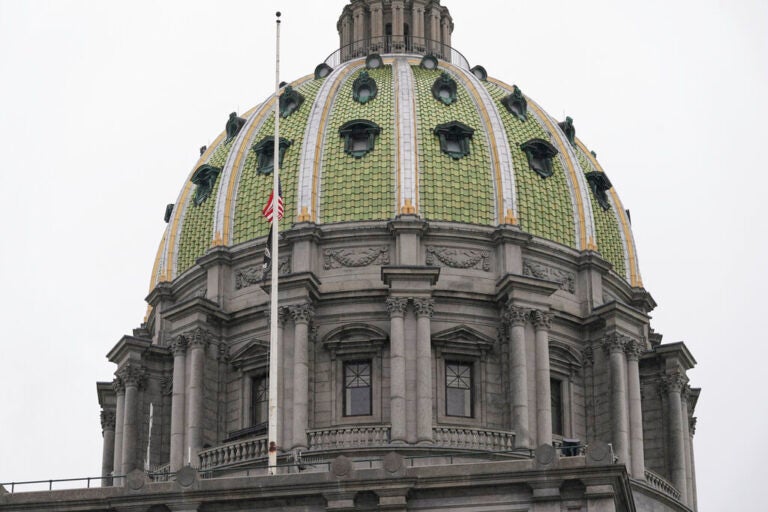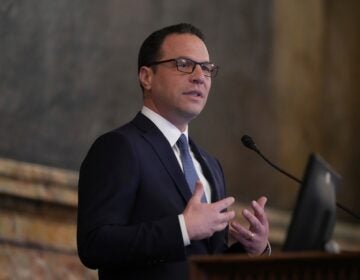Health workforce shortages, ACA protections, struggling hospitals among early Pa. legislative, budget priorities
Some early session bills in the Pennsylvania legislature align with Gov. Josh Shapiro’s health spending priorities and prepare for possible changes under Trump.

FILE - Shown is the Pennsylvania Capitol in Harrisburg, Pa., Tuesday, Feb. 21, 2023. (AP Photo/Matt Rourke)
From Philly and the Pa. suburbs to South Jersey and Delaware, what would you like WHYY News to cover? Let us know!
Health care is top of mind for Pennsylvania leaders and lawmakers this year as the state legislature begins hammering out a new budget and considers a slew of new bills and policies.
In his annual budget address Tuesday, Gov. Josh Shapiro urged legislators to tackle workforce shortages, distressed hospitals and for-profit private equity health care operations.
Meanwhile, Republicans say they’re focusing on bringing down spending and costs of programs like Medicaid, an insurance program for people with low incomes.
Here are some of the top health care legislative priorities getting attention early this year.
Affordable Care Act protections
The Affordable Care Act, passed into law by Congress in 2010, guarantees essential health benefits like free annual exams and insurance coverage for blood tests and prescriptions, mental health and addiction treatment, emergency care and more.
The federal law also bans the practice of insurers denying coverage because of pre-existing conditions, allows children to stay on their parents’ plans until the age of 26, and offers insurance options to individuals and small businesses.
During his first presidential term, Donald Trump attempted to repeal the ACA, but failed in the legislature. In his second term, he has pledged to make changes to the program and how it is funded, with no specific details yet on those plans.
In his budget address, Shapiro said that Pennsylvania should adopt ACA protections into state law. About 1.2 million people in the state get health care through ACA plans, officials said.
“If we fail to do so and the ACA goes away, health care costs will dramatically increase for Pennsylvanians,” he said.
Pennsylvania Senate and House Democrats are spearheading a series of bills that would adopt ACA protections into state law, with early support from some House Republicans. Bills have been referred to respective banking and insurance committees.
Private equity in health care
Private equity investments and acquisitions of health care systems and groups have dramatically risen over the last decade, national reports show.
Shapiro said that while the for-profit goal driving most private equity operations isn’t wrong or criminal, “They buy up hospitals and health care facilities, line their own pockets by stripping money and resources from those facilities, and compromising care.”
Then, he said, they “skip town” and leave communities with a gap in health care services.
The governor called on the legislature to grant the Attorney General’s Office more oversight of these private equity health companies by requiring them to file pre-transaction notifications for sales, mergers, acquisitions and bankruptcy claims.
Pennsylvania lawmakers have tried passing similar bills in previous sessions. Representatives from Delaware County have pushed legislation in the past to limit for-profit entities from owning or managing hospitals across the state.
Recently, Prospect Medical Holdings, the California-based parent company of Crozer Health in Delco, filed for bankruptcy after failing to sell the system’s four hospitals to a new buyer and pay existing debts. Over the years, programs and health care services have shut down. Only one hospital — Crozer-Chester Medical Center in Upland — remains operational as a full-service facility with an operating room.
The House passed a related bill last year, but the Senate did not take action before the end of session.
Health care workforce shortages
Experts predict that Pennsylvania will continue to see a significant shortage of health care workers, especially in home care, primary care and mental health.
Some areas and specialties are already suffering from fewer available providers.
In Philadelphia alone, where more than 66,000 children are at risk of possible mental and behavioral health disorders, there are only about 60 qualified psychiatrists to provide treatment, according to an American Academy of Child and Adolescent Psychiatrists report.
A bill with bipartisan support in the House aims to establish the J-1 Visa Waiver Primary Care Physician Grant Program, which would create a grant program to support international medical graduates who get approved to stay in the United States for work.
Participants would have to commit to working in Pennsylvania’s medically underserved areas for at least three years.
Another bipartisan bill in the House proposes a new grant program that would help hospitals in rural areas of the commonwealth attract and hire more nurses and physicians by offering money toward paying off student loans.
In his budget address, Shapiro suggested granting full practice authority to experienced nurse practitioners.
“This is smart — and it’s already passed,” he said. “The state Senate passed it last year on a bipartisan basis. Pass it again, send it to the House, and let’s get it to my desk.”
Vaccines, Medicaid spending, abortion access and medical debt
Other bills introduced early in this year’s session include efforts to establish a statewide minimum age for minors to get a vaccine without parental consent; enforce income eligibility requirements for programs like Medicaid and SNAP; reinforce access to abortion; and create a medical debt relief program.

Get daily updates from WHYY News!
WHYY is your source for fact-based, in-depth journalism and information. As a nonprofit organization, we rely on financial support from readers like you. Please give today.







